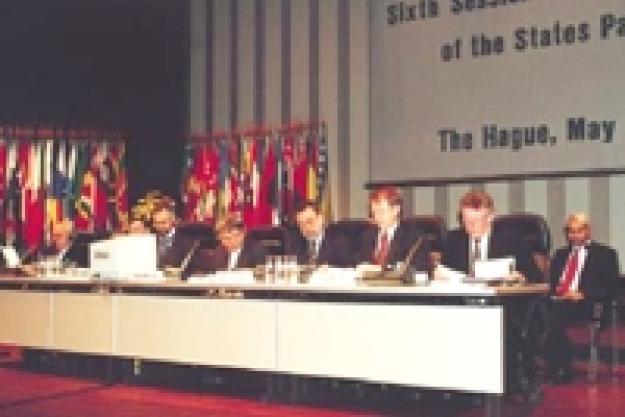
Sixth Session of the Conference of the States Parties.14-19 May 2001
The Sixth Session of the Conference of the States Parties, the OPCW’s highest governing body, concluded in The Hague on Saturday 19 May, 2001. The Conference was attended by 108 States Parties. Ambassador H. Reimann of Switzerland was elected Chairman of the Conference, succeeding Ambassador J. Lagos of Chile.
The past twelve months have seen a number of significant achievements for the OPCW. Ten new States Parties joined the Organisation, and the full programme of work for 2000 was completed. All 70,000 tonnes of declared chemical weapons have been entirely inventoried, almost 20% of the declared munitions and containers have been destroyed, and more than half of the declared chemical weapons production facilities world-wide have been certified as having been either destroyed or converted to peaceful purposes. The OPCW’s Director-General, José M. Bustani, indicated that the international community now has an efficiently functioning, multilateral tool for implementing the Convention, thus making the world a safer place. The Secretary-General of the United Nations, Kofi Annan, noted in his message to the Conference, that the OPCW has made steady progress in implementing the Convention’s provisions, and that its activities continued to expand. He mentioned that, “it is vital that the States Parties now give the OPCW their full support, in particular by providing the resources necessary for it to function effectively.”
Amongst the most important decisions adopted by this session of the Conference were the programme and budget for 2002, and a request from the Russian Federation for the conversion of a former chemical weapons production facility in Dzerzhinsk for peaceful purposes. The urgent necessity of increasing the membership of the OPCW to include all countries not yet party to the CWC was also endorsed.
The Conference of the States Parties also approved a relationship agreement with the United Nations. This was signed at UN Headquarters in New York on 17 October 2000. The agreement will be submitted to the UN General Assembly for approval at its forthcoming session. The relationship agreement provides an opportunity for more intensive cooperation between these two organisations in key areas of common interest, and particularly, in the crucial area of disarmament.
The Conference adopted a decision on the transfer of Schedule 3 chemicals to States not party to the Convention. This decision requires that end-use certificates be prepared when Schedule 3 chemicals are exported to States not party to the Convention, if the product to be exported contains 30 percent or more of a Schedule 3 chemical. An end-use certificate is not required for products identified as consumer goods packaged for commercial or individual purposes. The re-transfer of Schedule 3 chemicals by the receiving States is also prohibited.
The Conference addressed, and took decisions on, critical budgetary issues, the cause of the Organisation’s inability to receive all of its budgeted income in 2000 and 2001. It requested that the Executive Council arrive at a solution for the structural deficiencies in the budget. Such a solution would eliminate the problem of “fictitious income”, which has arisen primarily from unforeseen changes in the timetables of chemical weapons destruction in several States Parties before the end of 2001. It authorised the Secretariat – as an exceptional one-time measure – to retain the 1999 cash surplus, instead of redistributing it to Member States. The Conference also called for voluntary contributions, to ensure that sufficient resources would be available to the OPCW for it to effectively carry out its operational mandate. The Director-General stated that these decisions “form a package which might barely help the Organisation to get through its periods of crisis and austerity”. Despite the Organisation’s inadequate funding, Mr Bustani reiterated his firm intention to maximise programme delivery, particularly in the areas of international cooperation and inspections. Mr Bustani welcomed the Conference’s recognition of the fact that, in accordance with the requirements of the Convention, essential operational activities are to increase significantly in the coming few years. He also welcomed the Conference’s affirmation of its “readiness to ensure the availability of resources adequate to the full attainment by the Organisation of the objectives and purposes of the Convention”.
13/2001
